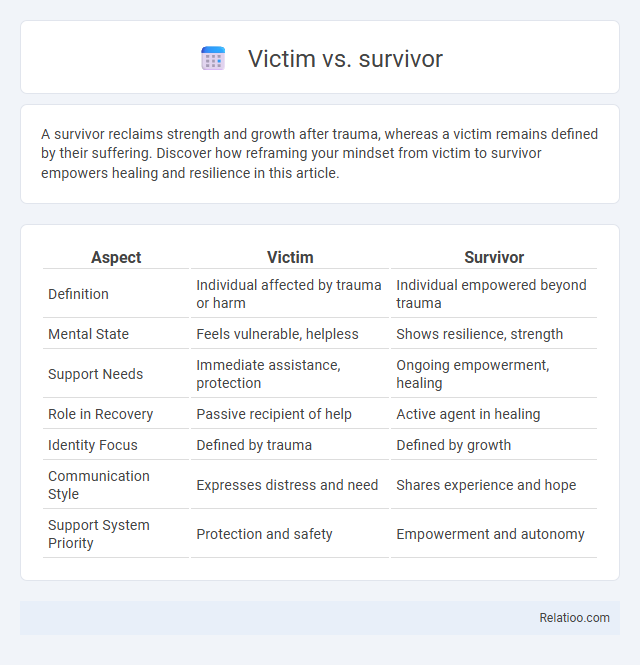A survivor reclaims strength and growth after trauma, whereas a victim remains defined by their suffering. Discover how reframing your mindset from victim to survivor empowers healing and resilience in this article.
Table of Comparison
| Aspect | Victim | Survivor |
|---|---|---|
| Definition | Individual affected by trauma or harm | Individual empowered beyond trauma |
| Mental State | Feels vulnerable, helpless | Shows resilience, strength |
| Support Needs | Immediate assistance, protection | Ongoing empowerment, healing |
| Role in Recovery | Passive recipient of help | Active agent in healing |
| Identity Focus | Defined by trauma | Defined by growth |
| Communication Style | Expresses distress and need | Shares experience and hope |
| Support System Priority | Protection and safety | Empowerment and autonomy |
Understanding the Terms: Victim vs Survivor
The terms "victim" and "survivor" differ significantly in the context of abuse, where a victim refers to someone who has experienced harm or violence, often emphasizing vulnerability and impact. A survivor, however, highlights resilience and empowerment, indicating a person who has endured trauma and is actively reclaiming control and healing. Understanding these distinctions is crucial for addressing trauma with sensitivity and promoting recovery-focused language in support services.
Historical Context of Victim and Survivor Labels
The historical context of the victim and survivor labels reveals shifting perspectives on trauma and empowerment over time. Originally, the term "victim" was most commonly used in legal and clinical settings, emphasizing helplessness and injury, while "survivor" emerged later during the feminist movements of the 1970s to highlight resilience and agency. Your understanding of these terms impacts how you interpret experiences of abuse and recovery, reflecting broader cultural and social changes in addressing trauma.
The Psychological Impact of Being Called a Victim
Being labeled a victim can deeply affect your psychological state, often reinforcing feelings of helplessness and diminishing self-worth. This identity may limit empowerment and recovery by emphasizing trauma rather than resilience and growth. Shifting the narrative to identify as a survivor promotes strength and healing, fostering a healthier mental outlook after abuse.
Empowerment Through the Survivor Identity
Embracing the survivor identity fosters empowerment by shifting focus from victimhood to resilience and healing. This transformation encourages reclaiming control, promoting mental health recovery, and building strength after abuse. Recognizing oneself as a survivor supports proactive growth and breaks the cycle of trauma through self-advocacy and community support.
Media Influence on Victim vs Survivor Narratives
Media influence on victim vs survivor narratives shapes public perception by often framing abuse victims as helpless and passive, which can undermine empowerment-focused survivor identities. Exposure to media portrayals that emphasize resilience and recovery supports a narrative shift toward survivor agency, fostering societal recognition of strength beyond victimization. Analytical studies highlight the role of media language in either reinforcing stigma or promoting healing, affecting policy discourse and community support structures.
Language Matters: Reframing the Conversation
Language matters profoundly when discussing abuse, as the terms "victim" and "survivor" carry distinct implications that influence perception and healing. Identifying as a survivor rather than a victim can empower you, emphasizing resilience and agency instead of helplessness. Reframing the conversation with precise language fosters respect, supports recovery, and challenges stigma surrounding abuse.
The Role of Support Systems in Identity Formation
Support systems play a crucial role in shaping whether individuals identify as victims or survivors of abuse, providing emotional validation and empowerment that fosters resilience. Access to empathetic counseling, community resources, and peer support networks significantly influences healing by reinforcing a narrative of survival rather than victimization. Consistent encouragement from these systems helps reframe traumatic experiences, enabling individuals to reclaim agency and build positive self-identities.
Legal and Social Implications of Labeling
The legal implications of labeling someone as a victim or survivor affect their rights, access to justice, and eligibility for protective measures, with "victim" often emphasizing vulnerability and "survivor" highlighting resilience. Socially, the terms influence public perception and support systems, where survivor identity may empower Your recovery journey, while victim status can sometimes lead to stigma or disempowerment. Understanding the nuances in abuse labeling is crucial for tailored legal protections and fostering supportive environments that respect individual experiences.
Personal Stories: Transitioning from Victim to Survivor
Personal stories highlight the profound journey of transitioning from victim to survivor, emphasizing empowerment through healing and resilience. Survivors often reclaim their identity by acknowledging their trauma while focusing on growth, strength, and overcoming the adverse effects of abuse. This transformation involves mental health support, community connections, and self-advocacy, illustrating the shift from vulnerability to agency.
Moving Forward: Encouraging Resilience and Healing
Victims of abuse often face complex emotional and psychological challenges, while survivors demonstrate resilience by actively engaging in healing processes and reclaiming their lives. Emphasizing therapeutic support, empowerment strategies, and community resources fosters recovery and long-term well-being. Moving forward involves transforming trauma into strength through personalized care and sustained encouragement.

Infographic: Victim vs survivor
 relatioo.com
relatioo.com